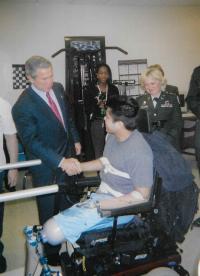Hall of Fame inductee keeps veteran health on the front lines
Billie J. Randolph, PhD, PT (Colonel, U.S. Army Retired) has known since childhood that helping people is in her DNA. What she didn’t know in those early years was just how far this calling was going to take her: from central Kentucky to the Army; to Walter Reed Army Medical Center; the White House; the United States Department of Veterans Affairs (VA), and more, Randolph has left a lasting mark on people and patients around the world.
Randolph’s storied career and deep commitment to serving others is one of many reasons why she was inducted into the College of Health Sciences Hall of Fame on Nov. 7.
Hailing from humble roots in Richmond, Kentucky, Randolph began to pursue a career in physical therapy (PT) after spending her weekends traversing eastern Kentucky mountain towns to deliver care.
“I really felt like this is what I was meant to do,” she said. “Because of PT, I saw the immediate impact I could have on people’s lives. Back in the 70’s, there were not many PT schools and I only applied to the University of Kentucky. It’s the best decision I’ve ever made.”
Randolph now serves as the Deputy Director and VA lead of the Extremity Trauma and Amputation Center of Excellence—a joint effort between the Department of Defense and Department of Veterans Affairs— and the Nation’s premiere center for promoting excellence and research related to traumatic extremity injuries and amputations. This position is just one among pages of her decorated resume.
In 1978, Randolph received a direct commission and entered military service. She is a graduate of the Army Combined Arms Services Staff School, the Command and General Staff College, the Army War College, and the Federal Executive Institute. She served in clinical assignments at Ft. Knox, Kentucky, Ft. Stewart, Georgia, Tripler Army Medical Center, Schofield Barracks, Hawaii, Ft. Leavenworth, Kansas, Ft. Campbell, Kentucky, and Walter Reed Army Medical Center.
“I really liked the military and the ability to practice independently,” she said. After going through all three of my clinicals, I called an Army recruiter and the rest is history.”
After completing her doctoral degree, Randolph returned to practice at Walter Reed Army Medical Center and was integral in crafting the medical response for soldiers in Afghanistan and Iraq during the aftermath of the September 11 terrorist attacks.
“I was at Walter Reed on 9/11. We made all these preparations, and once we learned the Pentagon was hit, the next step was deciding how to respond to the attacks,” she said. “In late 2001, I was called by the Army Surgeon General who asked me if I knew where Afghanistan was. He said ‘It’s a country filled with land mines. We’re going in and you’re the last person on active duty with any amputee experience.’”
“We had a big amputee program under Dr. McDougal when I was at UK,” Randolph continued. “Because of my experience, the Surgeon General asked me to set up an amputee center at Walter Reed. So that’s what I did. I recruited experts in the field of amputation care to come in and train our therapists and doctors. We started the amputee center and for years we saw every casualty that came through Walter Reed.”
In 2004, Randolph threw her hat in the ring for command. She was selected and made history as the first physical therapist to command a at the Army brigade level. “I commanded the medical units in Maryland and Pennsylvania,” she said. “It was the pinnacle of my military career to be in charge of those units.”
Randolph dedicated 28 years of her life to the Army before retiring and beginning her position with the VA in 2012. As a veteran herself, she feels privileged to serve other veterans and ensure they receive the best care possible.
“Serving our veterans and wounded warriors is the most amazing experience,” Randolph said. “If I’d had just a fraction of my knowledge today about the VA when I was on active duty, I would have been a far better therapist. I would have been able to refer my patients to the VA for services. It truly is the most incredible health care system. No other country comes close to what we provide.”
Taking care of those who protect our country is personal for Randolph. She is quick to give veterans her contact information so they can directly reach out to her with questions or concerns about their medical care.
“It’s always amazing to me when I have a Vietnam vet email me saying, ‘Hey I need help. I’m in the hospital and had a stroke. Can you help me?’”, she said. “There’s no better feeling than helping a veteran through the process of getting assistance and making them aware of the benefits available to them. I may not have all the answers, but I do have a network of people I can reach out to. That’s what drives me.”
Randolph said some of her most poignant memories are of treating the combat wounded from the most recent wars. “Some of my patients had lost all four limbs. I remember thinking ‘We can do this. We can help them.’ I don’t ever use the term ‘new normal’ because it’s never going to be normal for these patients. I help them get to the point where they feel confident to start rediscovering their lives.”
One of Randolph’s patients lost both his arms above the elbows and was completely blind and paralyzed on one side from a traumatic brain injury. “His wife has just delivered their third child and I wanted him to know he would be able to hold his baby girl,” she said. “We fit him with prosthetic arms and sent him to the VA for blind rehabilitation. His is just one of thousands of stories. It is a blessing to to serve him and every patient who comes across my path.”
Randolph has even fostered research into prosthetic components for women. “A female veteran came to me and was having trouble finding prosthetic components for her artificial limb because of her height,” she said. “The smallest foot they could find was a seven and a half and she only wore a five and a half. She was forced to wear different size shoes on her feet which was not ideal.”
Because of this interaction, Randolph began looking into the issue and found the majority of all adult prosthetic components were made for the 50th percentile man. She immediately began to call manufacturers to enact change.
“More importantly, I began to look at the literature which revealed there is very little written about the needs of female amputees,” Randolph said. “I’m now working on bringing this to the attention of the right people so we can get funding from Congress specifically mandated for female amputation research.”
In addition to delivering compassionate care to our veterans, Randolph served two years as the White House physical therapist for former President George W. Bush. “It was humbling and yet exciting to be in the White House caring for the most powerful leader in the free world,” she said. “Not bad at all for a little farm girl from Kentucky!”
“That’s really what my career has been about,” Randolph continued. “I’ve had the honor of caring for all ranks in the military – from privates to Joint Chiefs, as well as the Nation’s leaders in the Executive, Legislative, and Judicial Branches. But I’ve learned from all of them. Every single person I’ve worked with has given me back more than I could have ever given them.”

